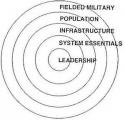if it were the case.from Ken
From the local Shura or local warlord -- if either were allowed to operate as they should and were not constrained by Eurocentric concerns over equity and 'the rule of law.' Nothing wrong with the rule of law, it just doesn't have to be our version of law...
The problem, as I understand it, was the destruction of Astan's local legal institutions which existed ca. 1970, under a loose form of monarchy which was slowly moving toward "modernity" (which possibly, but for the wars, would have developed its own Afghan form).
The Rule of Law has to be the rule of law indigenous to its subjects. I have been consistent with that theory in many posts - and have to be, given my belief that law "bubbles up" from the society who are subjects of that Rule of Law. Those subjects are also its creators.
Now, given the case at hand, if you have evidence that local legal systems, whether local Shura or local warlord, are actually working in Astan, I would like to see it and would be happy to be proved wrong. That situation, if applicable to a material portion of Astan's 40,000 villages, would give me much more confidence for the future than I have. So, please bring on any such evidence that shows a working local legal system in Astan.
------------------------------
Unfortunately, this is probably true, at least in part:
My take is that we do have an obligation to clean up the garbage in a neighborhood, even if (1) we should not have been in the neighborhood in the first place; or (2) if we were there for a good reason, we should not have littered the neighborhood. Our former friend Saddam Hussein was such garbage, which for that and other reasons had to be removed. The means used to clean the neighborhood need not be as extreme as that in Iraq.from Ken
Of course the GOA is part of the problem. We created it thus it's become our problem.
But, our obligation to clean up our garbage is subject to a limitation. We have to forego that obligation if in doing so we will worsen the neighborhood's condition. I believe that Astan is very close to that tipping point.







 systems remain integrated (whole) when they provide mutual benefit which is why they were caused to form in the first place. (the governed ....the government.... and the binding consent to be governed) When they don't they begin to bifurcate (split apart) as in the Civil War(war of northern aggression). Which is why it is total bullstuff that democracies are stable. They are designed to be unstable
systems remain integrated (whole) when they provide mutual benefit which is why they were caused to form in the first place. (the governed ....the government.... and the binding consent to be governed) When they don't they begin to bifurcate (split apart) as in the Civil War(war of northern aggression). Which is why it is total bullstuff that democracies are stable. They are designed to be unstable 




Bookmarks